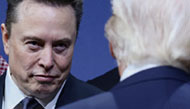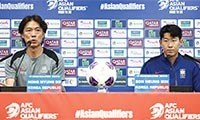In an excellent piece on Lemov for The Guardian, Ian Leslie emphasizes that these subtle skills are often not recognized or even discussed by those who talk about education policy, or even by those who evaluate teachers.
Leslie notes that the Los Angeles school system tabulated the performance of roughly 6,000 teachers, using measures of student achievement. The best performing teacher in the whole system was a woman named Zenaida Tan. Up until that report, she was completely unheralded. The skills she possessed were invisible. Meanwhile, less important traits were measured on her evaluations (three times she was late to pick up students from recess).
In part, Lemov is talking about the skill of herding cats. The master of cat herding senses when attention is about to wander, knows how fast to move a diverse group, senses the rhythm between lecturing and class participation, varies the emotional tone. This is a performance skill that surely is relevant beyond education.
This raises an important point. As the economy changes, the skills required to thrive in it change, too, and it takes a while before these new skills are defined and acknowledged.
For example, in today’s loosely networked world, people with social courage have amazing value. Everyone goes to conferences and meets people, but some people invite six people to lunch afterward and follow up with four carefully tended friendships forevermore. Then they spend their lives connecting people across networks.
People with social courage are extroverted in issuing invitations but introverted in conversation . willing to listen 70 percent of the time. They build not just contacts but actual friendships by engaging people on multiple levels. If you’re interested in a new field, they can reel off the names of 10 people you should know. They develop large informal networks of contacts that transcend their organization and give them an independent power base. They are discriminating in their personal recommendations since character judgment is their primary currency.
Similarly, people who can capture amorphous trends with a clarifying label also have enormous worth. Karl Popper observed that there are clock problems and cloud problems. Clock problems can be divided into parts, but cloud problems are indivisible emergent systems. A culture problem is a cloud, so is a personality, an era and a social environment.
Since it is easier to think deductively, most people try to turn cloud problems into clock problems, but a few people are able to look at a complex situation, grasp the gist and clarify it by naming what is going on.
Such people tend to possess negative capacity, the ability to live with ambiguity and not leap to premature conclusions. They can absorb a stream of disparate data and rest in it until they can synthesize it into one trend, pattern or generalization.
Such people can create a mental model that helps you think about a phenomenon. As Oswald Chambers put it, “The author who benefits you most is not the one who tells you something you did not know before, but the one who gives expression to the truth that has been dumbly struggling in you for utterance.”
We can all think of many other skills that are especially valuable right now:
Making nonhuman things intuitive to humans. This is what Steve Jobs did.
Purpose provision. Many people go through life overwhelmed by options, afraid of closing off opportunities. But a few have fully cultivated moral passions and can help others choose the one thing they should dedicate themselves to.
Opposability. F. Scott Fitzgerald wrote, “The test of a first-rate intelligence is the ability to hold two opposed ideas in mind at the same time and still retain the ability to function.” For some reason I am continually running across people who believe this is the ability their employees and bosses need right now.
Cross-class expertise. In a world dividing along class, ethnic and economic grounds some people are culturally multilingual. They can operate in an insular social niche while seeing it from the vantage point of an outsider.
One gets the impression we’re confronted by a giant cultural lag. The economy emphasizes a new generation of skills, but our vocabulary describes the set required 30 years ago. Lord, if somebody could just identify the skills it takes to give a good briefing these days, that feat alone would deserve the Nobel Prize.
스마터리빙
more [ 건강]
[ 건강]이제 혈관 건강도 챙기자!
[현대해운]우리 눈에 보이지 않기 때문에 혈관 건강을 챙기는 것은 결코 쉽지 않은데요. 여러분은 혈관 건강을 유지하기 위해 어떤 노력을 하시나요?
 [ 건강]
[ 건강]내 몸이 건강해지는 과일궁합
 [ 라이프]
[ 라이프]벌레야 물럿거라! 천연 해충제 만들기
 [ 건강]
[ 건강]혈압 낮추는데 좋은 식품
[현대해운]혈관 건강은 주로 노화가 진행되면서 지켜야 할 문제라고 인식되어 왔습니다. 최근 생활 패턴과 식생활의 변화로 혈관의 노화 진행이 빨라지고
사람·사람들
more
“취미생활로 다진 친목… 선후배들과 만든 모교사랑”
사진러브한인 사진 동호회 사진러브(회장 크리스 고)는 13일 용수산에서 송년모임을 갖고 한 해를 마무리하는 뜻깊은 시간을 가졌다. 이날 모임에…

[홀인원] 이상원 박사
일반외과 전문의 이상원(왼쪽) 박사가 지난 9일 뉴포트비치 소재 골프장 9번 홀(152야드)에서 레스큐 클럽으로 친 샷이 그대로 홀에 빨려 들…
[송년행사 게시판] 재미시인협회
재미시인협회(회장 지성심)는 오는 20일 오후 4시 가든스윗호텔에서 한 해를 마무리하며 동인지 ‘외지’ 제35집 출판 기념회와 ‘제23회 재미…
[송년행사 게시판] 향군단체 연합
6.25 참전유공자회와 대한민국 육군협회 등 남가주 지역 향군 단체 연합은 19일 오전 11시30분, 용궁에서 송년 행사를 개최한다. 드레스코…
[송년행사 화보] “이웃과 함께 나누고 지인과 함…
KYCC13일 윌튼 플레이스 초등학교에서 열린 ‘한인타운청소년회관(KYCC) 홀리데이 카니발’이 성황리에 막을 내렸다. 올해는 KYCC 창립 …
많이 본 기사
- “1인당 2,000달러 환급금·세금 … 4
- 법무부, ‘엡스타인문건’ 공개…정재계 추가 연루 증거 나올까
- 尹, 김건희특검 첫 출석…변호인 “아내 금품수수 몰랐다”
- 해군, 트럼프 ‘황금함대’ 새 전함 발주… “외국조선사도 활용”
- 美, IS 무기고 등 70여곳 공습… “전쟁 시작 아닌 복수 선언”
- 테라폼랩스 파산관재인, 테라 가격부양 금융사에 수조원대 소송
- 李대통령 “재외국민 우편·전자투표 등 참정권 확대 방안 추진”
- 개명 하루만에 케네디센터 외벽에 ‘트럼프’ 추가…위법 논란도
- 구글, 검색결과 크롤링 업체 상대 소송…AI 경쟁사 견제 의도
- ‘유세방불’ 트럼프 “관세가 물가 올린다더니 인플레 수년來 최저”
- “트럼프, 강경화 대사에 ‘李대통령과 최고의 협력관계’ 언급”
- ‘테슬라 2018년 머스크 보상안’ 법원서 부활…1천400억달러 규모
- 美, 베네수 마두로 압박 강화…처제·동서·조카 무더기 제재
- ‘80세’ 선우용여, 대세 유튜브 수… 1
- ‘반이민 가속페달’⋯ 시민권자도 대거… 3
- ‘수퍼 독감’ 확산… 확진 4배 급증
- LIRR 모바일 탑승권 탑승전 활성화해야
- 브라운대 총격 용의자 시신 발견… ‘… 1
- 故윤석화 빈소에 추모 발길… “하늘에서 좋은 작품 많이 하기를”
- “박나래, 주사 이모 약에 내성 생겨..약 떨어지면 연락하라고”
- ‘김혜성도 넘었다’ 6년 120억 결… 1
- 센터빌 식당서 벌써 4% 부과 ‘말썽… 1
- 트럼프, 화성은 미루고 달부터…머스크… 2
- 시민권 박탈 착수⋯매달 200명 1
- 뉴욕-뉴저지 다리· 터널 통행료 또 오른다
- 거주·투자용 한국 부동산 인기… 한인 유치 ‘치열’
- 동업자에서 채무자로..MC몽, 차가원… 1
- “스페이스X, 상장 주관사 선정 착수…모건스탠리 유력”
- 구리 절도 기승⋯ 가로등 ‘깜깜’
- 尹 소환한 김건희특검, ‘명태균 의혹’부터 6가지 혐의 순차 추궁
- 트럼프 측근에 구글 창업자도…엡스타인… 1
- 팀스피릿 부동산그룹 송년모임
- 40·50대 은퇴, 자산은 있는데 확신은 없다
- ‘통일교 의혹’ 전재수, 14시간여 마라톤 조사…혐의 전면 부인
- 글로벌제약사 9곳 ‘약값 인하’ 동참…트럼프 “全미국인에 혜택”
- “AI 보안으로 클라우드 시장 잡자”…구글, 100억 달러 보안 파트너십
- 한국타이어, 테네시공장 증설… 생산 두배로
- “개인 부동산 취득, 법카 사적 유용” 박수홍 친형 구속 이유 보니
- [홀인원] 이상원 박사
- 기아 미국법인, 2026년형 ‘K4 … 1
- 루비오 국무장관 “韓·日 등 동맹과 약속 훼손 없이 中과 협력 모색”
- 뉴욕주 차량운전자 벌점 규정 대폭 강화
- 뉴욕한인회 곽호수 이사장 ‘회장 판공비 논란’ 전격사임
- 시신 훔쳐 팔아넘긴 부부 징역 중형 1
- “암 검진 본인 부담금 폐지”
- 한인 부인 살해 혐의 남편 법정 출두 무죄 주장
- [화제] 베조스 전 부인… ‘기부의 여왕’ 변신
- [새해부터 이렇게 달라진다] 최저임금 또 오르고… 유급 병가는 더 확대
- 전현무, 차량 링거 결국 입 열었다.. “의사 진료 처방..불법 NO”
- “취미생활로 다진 친목… 선후배들과 만든 모교사랑”
1/5지식톡

-
 ☝️해외에서도 가능한 한국어 선생님…
0
☝️해외에서도 가능한 한국어 선생님…
0이 영상 하나면 충분합니다!♥️상담신청문의♥️☝️ 문의 폭주로 '선착순 상담'만 진행합니다.☎️ : 02-6213-9094✨카카오톡ID : @GOODEDU77 (@골뱅이 꼭 붙여주셔야합니다…
-
 테슬라 자동차 시트커버 장착
0
테슬라 자동차 시트커버 장착
0테슬라 시트커버, 사놓고 아직 못 씌우셨죠?장착이 생각보다 쉽지 않습니다.20년 경력 전문가에게 맡기세요 — 깔끔하고 딱 맞게 장착해드립니다!장착비용:앞좌석: $40뒷좌석: $60앞·뒷좌석 …
-
 식당용 부탄가스
0
식당용 부탄가스
0식당용 부탄가스 홀세일 합니다 로스앤젤레스 다운타운 픽업 가능 안녕 하세요?강아지 & 고양이 모든 애완동물 / 반려동물 식품 & 모든 애완동물/반려동물 관련 제품들 전문적으로 홀세일/취급하는 회사 입니다 100% …
-
 ACSL 국제 컴퓨터 과학 대회, …
0
ACSL 국제 컴퓨터 과학 대회, …
0웹사이트 : www.eduspot.co.kr 카카오톡 상담하기 : https://pf.kakao.com/_BEQWxb블로그 : https://blog.naver.com/eduspotmain안녕하세요, 에듀스팟입니다…
-
 바디프렌드 안마의자 창고 리퍼브 세…
0
바디프렌드 안마의자 창고 리퍼브 세…
0거의 새제품급 리퍼브 안마의자 대방출 한다고 합니다!8월 23일(토)…24일(일) 단 이틀!특가 판매가Famille: $500 ~ $1,000Falcon: $1,500 ~ $2,500픽업 & 배송직접 픽업 가능LA…
케이타운 1번가
오피니언
 한영일 / 서울경제 논설위원
한영일 / 서울경제 논설위원[만화경] 웰다잉 인센티브
 캐슬린 파커 워싱턴포스트 칼럼니스트
캐슬린 파커 워싱턴포스트 칼럼니스트 [캐슬린 파커 칼럼] 아이들을 온라인에서 보호하기
 양상훈 수필가ㆍ시인
양상훈 수필가ㆍ시인 [한국춘추] 경제대공황ㆍ제2차 세계대전 승리로 극복한 루스벨트 리더쉽

[왈가 왈부] 고환율에 외환 건전성 완화·서학개미 규제… 미봉책 아닌가요
 수잔 최 한미가정상담소 이사장 가정법 전문 변호사
수잔 최 한미가정상담소 이사장 가정법 전문 변호사 [수잔 최 변호사의 LIFE &] AI 시대 편리함에 안주하지 말자
 김도년 성균관대 건축학과 교수 스마트도시·건축학회장
김도년 성균관대 건축학과 교수 스마트도시·건축학회장 [로터리] 지멘스가 만드는 미래 동네
1/3지사별 뉴스

퀸즈장로교회 ‘사랑의 바구니’130개 이웃에 전달
퀸즈장로교회가 18일 크리스마스를 앞두고 교인들의 정성과 사랑이 듬뿍 담긴 ‘사랑의 바구니’ 130개를 소방서와 경찰서, 요양원, 선교회, 그…
시민권 박탈 착수⋯매달 200명

“이웃 돌보는 여러분이 동역자”
워싱턴성광교회(담임목사 임용우)는 18일 한인단체와 소방서‧도서관 등에 총 2만9천 달러의 성금을 전달했다. 지난 2011년부터 15년째 지역…
소기업 지원에 1천만 달러 투자

위기의 트럼프 “내년봄 최대규모 세금환급”
트럼프 대통령은 17일 “취임 1년 만에 우리는 누구도 상상하지 못한 성과를 이뤄냈다”고 말했다.트럼프 대통령은 동부시간 이날 밤 9시부터 백…
[새해부터 이렇게 달라진다] 최저임금 또 오르고… 유급 병가는 더 확대

오늘 하루 이 창 열지 않음 닫기 




















































.png)


댓글 안에 당신의 성숙함도 담아 주세요.
'오늘의 한마디'는 기사에 대하여 자신의 생각을 말하고 남의 생각을 들으며 서로 다양한 의견을 나누는 공간입니다. 그러나 간혹 불건전한 내용을 올리시는 분들이 계셔서 건전한 인터넷문화 정착을 위해 아래와 같은 운영원칙을 적용합니다.
자체 모니터링을 통해 아래에 해당하는 내용이 포함된 댓글이 발견되면 예고없이 삭제 조치를 하겠습니다.
불건전한 댓글을 올리거나, 이름에 비속어 및 상대방의 불쾌감을 주는 단어를 사용, 유명인 또는 특정 일반인을 사칭하는 경우 이용에 대한 차단 제재를 받을 수 있습니다. 차단될 경우, 일주일간 댓글을 달수 없게 됩니다.
명예훼손, 개인정보 유출, 욕설 등 법률에 위반되는 댓글은 관계 법령에 의거 민형사상 처벌을 받을 수 있으니 이용에 주의를 부탁드립니다.
Close
x